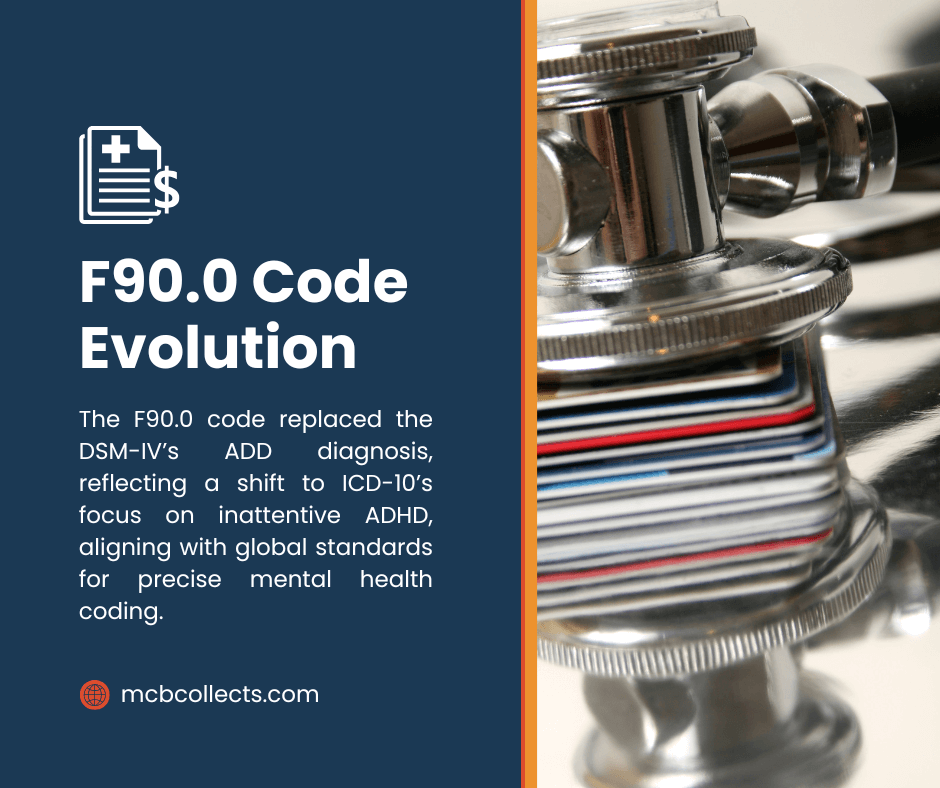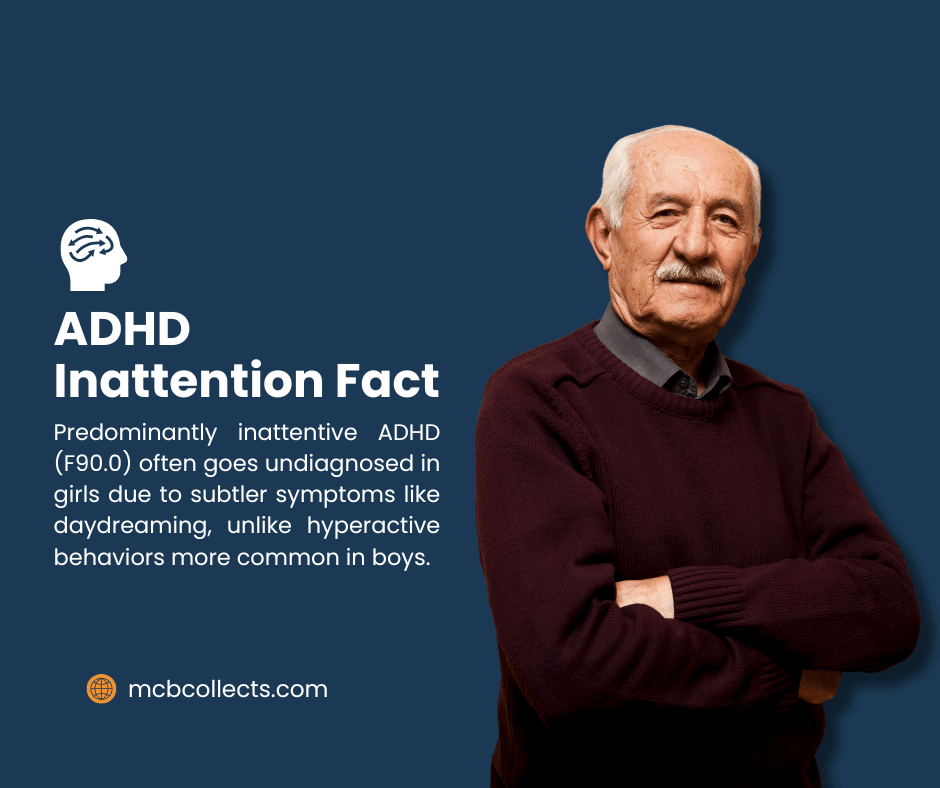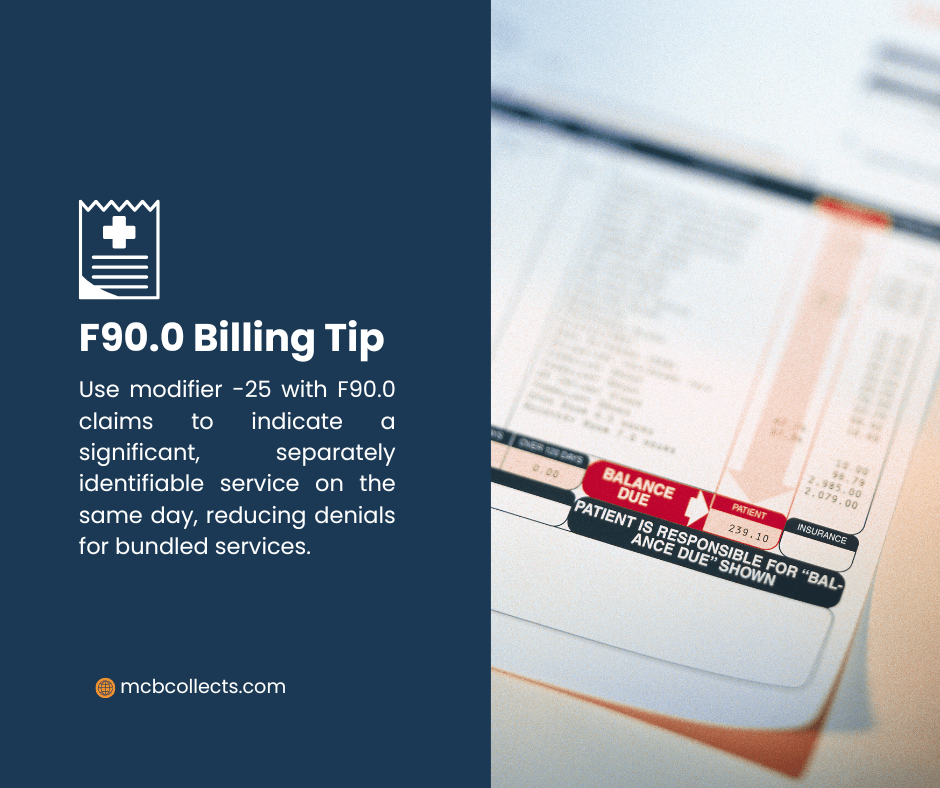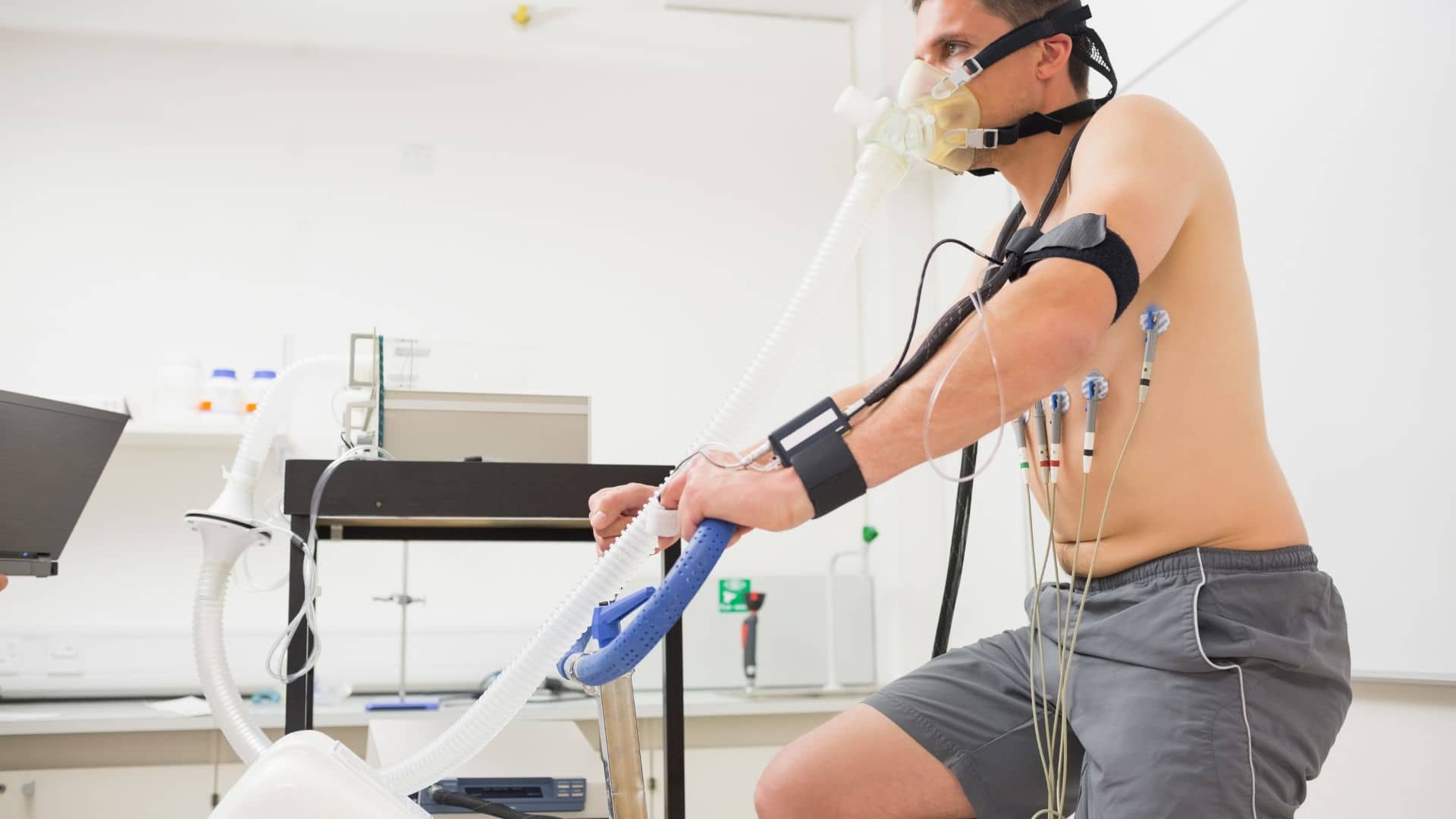Clinical Summary
The F90.0 code identifies the predominantly inattentive type of Attention-deficit hyperactivity disorder (ADHD) in the ICD-10-CM system. Our comprehensive breakdown of F90.0 covers key diagnostic markers, documentation essentials, and billing implications that impact healthcare providers daily. Mastering this code’s application directly affects billing accuracy, treatment strategies, and revenue cycles for mental health practices.
Note: This content serves educational purposes only and shouldn’t replace official coding guidance. Providers must consult current medical coding guidelines and use clinical judgment when assigning diagnostic codes.

Introduction:
Healthcare practice leaders and billing decision-makers face significant challenges in accurately documenting and coding mental health conditions.
The F90.0 ICD-10 code designates Attention-deficit hyperactivity disorder, predominantly inattentive type; a neurodevelopmental disorder characterized by persistent patterns of inattention that interfere with functioning or development.
Proper application of the F90.0 code requires precise clinical documentation that satisfies both medical necessity requirements and payer-specific policies.
This guide provides healthcare administrators, clinicians, and billing specialists with the essential information needed to navigate the complexities of ADHD diagnostic coding while optimizing reimbursement processes.
What is the F90.0 ICD-10 Code?
The F90.0 code is part of the ICD-10-CM (International Classification of Diseases, 10th Revision, Clinical Modification) coding system under Chapter 5: Mental, Behavioral and Neurodevelopmental disorders (F01-F99). This specific code represents “Attention-deficit hyperactivity disorder, predominantly inattentive type,” previously known as ADD (Attention Deficit Disorder) in earlier classification systems.
F90.0 in the ICD-10 Hierarchy
Understanding the hierarchical position of F90.0 provides important context for its proper application:
| Level | Code | Description |
| Chapter | F01-F99 | Mental, Behavioral and Neurodevelopmental disorders |
| Category | F90 | Attention-deficit hyperactivity disorders |
| Subcategory | F90.0 | Attention-deficit hyperactivity disorder, predominantly inattentive type |
The F90 category includes several related codes that clinicians must carefully differentiate:
| Code | Description |
| F90.0 | Attention-deficit hyperactivity disorder, predominantly inattentive type |
| F90.1 | Attention-deficit hyperactivity disorder, predominantly hyperactive type |
| F90.2 | Attention-deficit hyperactivity disorder, combined type |
| F90.8 | Attention-deficit hyperactivity disorder, other type |
| F90.9 | Attention-deficit hyperactivity disorder, unspecified type |
Clinical Diagnostic Criteria for F90.0
The application of the F90.0 code requires thorough clinical assessment and documentation that aligns with established diagnostic criteria. According to current clinical guidelines, the predominantly inattentive presentation of ADHD is characterized by meeting six or more symptoms of inattention (five for older adolescents and adults) for at least six months, to a degree that is inconsistent with developmental level and negatively impacts social, academic, or occupational activities.
Inattention Symptoms Required for F90.0 Diagnosis
Accurate documentation must reference specific inattention symptoms, which may include:
| Inattention Symptoms | Clinical Manifestations |
| Careless mistakes | Makes frequent errors in schoolwork, work, or activities requiring sustained attention |
| Sustaining attention | Difficulty maintaining focus during tasks, conversations, or prolonged reading |
| Listening | Appears not to listen when directly addressed |
| Following through | Fails to complete tasks, schoolwork, or workplace duties |
| Organization | Demonstrates poor organization skills in tasks and activities |
| Sustained mental effort | Avoids or is reluctant to engage in tasks requiring sustained mental effort |
| Losing items | Frequently misplaces materials necessary for tasks or activities |
| Distractibility | Easily distracted by extraneous stimuli or unrelated thoughts |
| Forgetfulness | Forgetful in daily activities, routine tasks, or appointments |
For proper code assignment, clinicians must document that symptoms:
- Persist for at least 6 months
- Are inconsistent with developmental level
- Negatively impact functioning
- Were present before age 12
- Occur in two or more settings
- Are not better explained by another mental disorder
Documentation Requirements for Accurate F90.0 Coding
Healthcare providers must maintain comprehensive documentation to support the F90.0 diagnosis. This documentation is essential for both medical necessity validation and proper reimbursement.

Required Documentation Elements
Essential documentation components include:
| Documentation Category | Required Elements |
| Symptom Assessment | Detailed description of inattention symptoms with severity and duration |
| Functional Impact | Specific effects on academic, social, or occupational functioning |
| Developmental History | Evidence of symptom onset before age 12 |
| Multi-setting Confirmation | Documentation of symptoms across two or more settings (e.g., home, school, work) |
| Differential Diagnosis | Exclusion of other conditions that might better explain the symptoms |
| Standardized Assessments | Results from validated rating scales or neuropsychological testing |
| Treatment Planning | Outlined approaches for addressing the condition |
Practices utilizing mental health CPT codes for ADHD assessment should ensure that documentation clearly supports both the diagnostic code and the procedural services provided. Common assessment procedures might include 90791 CPT code for psychiatric diagnostic evaluation or 96130 CPT code for psychological testing.
Billing and Reimbursement Considerations for F90.0
Understanding the reimbursement landscape for F90.0 is crucial for practice financial health. Several factors influence payment for services related to this diagnosis.
Payer Policies and Medical Necessity
Insurance coverage for ADHD assessment and treatment varies significantly across payers. Practice administrators should consider:
| Payer Consideration | Key Points |
| Coverage Limitations | Many plans limit the number of assessment or therapy sessions |
| Prior Authorization | Requirements for specialized testing or certain treatments |
| Documentation Thresholds | Specific clinical findings needed to establish medical necessity |
| Allowed Provider Types | Restrictions on which providers can bill for ADHD services |
Common Services Associated with F90.0
Services frequently billed with the F90.0 diagnosis include:
- Initial Assessment Services: 90791 (psychiatric diagnostic evaluation) or 90792 (psychiatric diagnostic evaluation with medical services)
- Psychological Testing: 96130/96131 (psychological testing administration and interpretation) and 96136/96137 (psychological test administration)
- Therapy Services: 90832 (30-minute psychotherapy), 90834 (45-minute psychotherapy), or 90837 (60-minute psychotherapy)
- Family Therapy: 90846 (family psychotherapy without patient) or 90847 (family psychotherapy with patient)
- Group Therapy: 90849 (multiple-family group psychotherapy) or 90853 (group psychotherapy)
- Telehealth Services: 98966, 98967, 98968, G2012, and G2010 for virtual check-ins and remote evaluations
Differential Diagnosis and Secondary Codes
Accurate diagnosis requires careful differentiation from other conditions with similar presentations. Clinicians should consider related mental health conditions that might better explain symptoms or occur comorbidly with ADHD.
Common Differential Diagnoses
| Condition | ICD-10 Code | Distinguishing Features |
| Specific Learning Disorder | F81.0-F81.9 | Difficulties specifically in academic skills acquisition |
| Intellectual Disability | F70-F79 | Global cognitive impairment across multiple domains |
| Autism Spectrum Disorder | F84.0 | Social communication deficits, restricted/repetitive behaviors |
| Major Depressive Disorder | F32.1, F32.2, F32.3 | Episode-based attention problems with prominent mood symptoms |
| Generalized Anxiety Disorder | F41.1 | Worry-driven concentration difficulties |
| Adjustment Disorder | F43.10 | Stressor-related symptoms with clear temporal relationship |
| Bipolar Disorder | F31.9 | Episodic attention problems during mood episodes |
| Obsessive-Compulsive Disorder | F42 | Obsessions/compulsions causing attention difficulties |
Comorbid Conditions
Many patients with ADHD present with coexisting conditions that require additional diagnostic codes. Common comorbidities include:
- Oppositional Defiant Disorder (F91.3)
- Conduct Disorder (F91.1-F91.9)
- Anxiety Disorders (F41.1)
- Mood Disorders (F30-F39)
- Substance Use Disorders (F10-F19, including F10.20, F11.20, F12.20)
- Learning Disorders (F81)
When comorbidities exist, proper sequencing of codes is essential for accurate claims processing. Generally, the condition that is the primary focus of treatment should be listed first.

Treatment Approaches for F90.0
Comprehensive management of predominantly inattentive ADHD typically involves multiple modalities. Documentation should clearly outline the treatment plan, which may include:
Evidence-Based Interventions
| Treatment Modality | Typical Services | Associated Codes |
| Medication Management | Prescription and monitoring of stimulants, non-stimulants | E/M codes, 90792 |
| Cognitive Behavioral Therapy | Individual therapy focused on organization, attention skills | 90834, 90837 |
| Parent Training | Family sessions to implement behavioral strategies | 90846, 90847 |
| Educational Interventions | School consultation, IEP/504 planning | Case management codes |
| Skills Training | Groups focusing on executive functioning skills | 90853 |
| Coaching | Individual support for the implementation of strategies | Case management codes |
Providers should document the medical necessity for each treatment component and ensure that services align with evidence-based practice guidelines.
Practical Coding Tips for F90.0
Healthcare administrators and billing specialists should implement these strategies to optimize F90.0 coding:
- Specificity Matters: Always use the most specific code available. F90.0 specifically indicates predominantly inattentive type, which differs from F90.1 (predominantly hyperactive type) or F90.2 (combined type).
- Documentation Alignment: Ensure clinical notes clearly support the F90.0 diagnostic criteria with specific examples of inattentive symptoms.
- Temporal Requirements: Confirm documentation indicates symptom duration of at least 6 months and onset before age 12.
- Setting Verification: Document symptom presence across at least two settings (e.g., home and school).
- Functional Impact: Clearly articulate how symptoms impair social, academic, or occupational functioning.
- Annual Reassessment: Schedule regular reassessments to confirm continued applicability of the F90.0 code.
- Comorbidity Documentation: When listing multiple diagnoses, ensure each is supported by distinct clinical evidence.
Revenue Cycle Optimization for F90.0 Services
Practices can implement strategic approaches to improve reimbursement for services related to the F90.0 diagnosis:
Best Practices for F90.0 Claims Management
- Pre-authorization Protocols: Develop standardized processes for obtaining prior authorizations for ADHD assessments and treatments.
- Clinician Education: Provide regular training on proper documentation requirements specific to F90.0.
- Denial Prevention: Implement pre-submission claim reviews focusing on common F90.0 denial reasons.
- Modifiers Usage: Appropriately apply modifiers when multiple services are delivered on the same date.
- Documentation Templates: Develop structured templates that capture all required elements for F90.0 justification.
Practices seeking to optimize their mental health billing processes should consider specialized mental health billing services that understand the nuances of behavioral health coding and documentation requirements.

Related ICD-10 Mental Health Codes
Healthcare providers should be familiar with other commonly used mental health diagnostic codes that may be relevant in ADHD assessment and treatment:
| Code | Description | Related to F90.0 |
| F99 | Mental disorder, not otherwise specified | Used temporarily pending definitive diagnosis |
| F32.9 | Major depressive disorder, unspecified | Common comorbidity |
| F41.9 | Anxiety disorder, unspecified | Common comorbidity |
| F91.9 | Conduct disorder, unspecified | Common comorbidity |
| F81.9 | Developmental disorder of scholastic skills, unspecified | Common comorbidity |
For comprehensive reference on mental health coding, providers should review complete ICD-10 codes for mental health.
Conclusion: Ensuring Compliance and Optimizing Reimbursement
Accurate application of the F90.0 code requires a thorough understanding of both clinical diagnostic criteria and coding guidelines. Healthcare administrators and providers who implement best practices in documentation and coding can not only ensure compliance but also optimize reimbursement for ADHD assessment and treatment services.
Decision-makers in healthcare practices should consider implementing specialized billing solutions to address the complexities of mental health coding. MCB Collects offers comprehensive revenue cycle management services specifically designed for mental health practices, with expertise in navigating the intricate landscape of behavioral health reimbursement.
Taking Action to Improve F90.0 Coding and Billing
Practices struggling with denied claims or reduced reimbursements for ADHD services should consider:
- Conducting a documentation audit to identify gaps in clinical support for F90.0 coding
- Implementing specialized medical billing consulting services to address coding challenges
- Exploring denial management services to recover missed revenue
- Utilizing advanced medical billing reporting solutions to identify patterns in claim denials
With proper implementation of these strategies, healthcare practices can ensure appropriate reimbursement while delivering quality care to patients with predominantly inattentive ADHD.
Resources for Healthcare Providers
For additional guidance on mental health coding and billing, providers can access these authoritative resources:
- American Psychiatric Association DSM-5 Coding Updates
- American Academy of Pediatrics ADHD Clinical Practice Guidelines
- Centers for Medicare & Medicaid Services Mental Health Services Billing Guide
- American Academy of Professional Coders Behavioral Health Documentation Guidelines
Note: This content was medically reviewed by a board-certified psychiatrist specialized in ADHD diagnosis and treatment.












